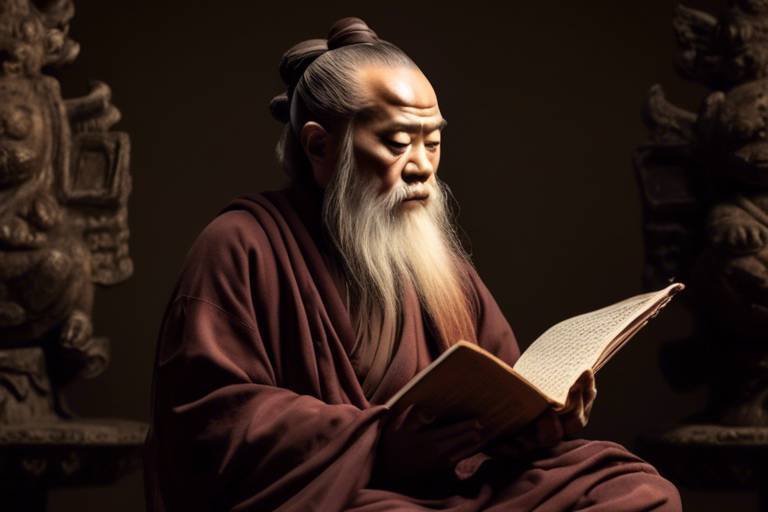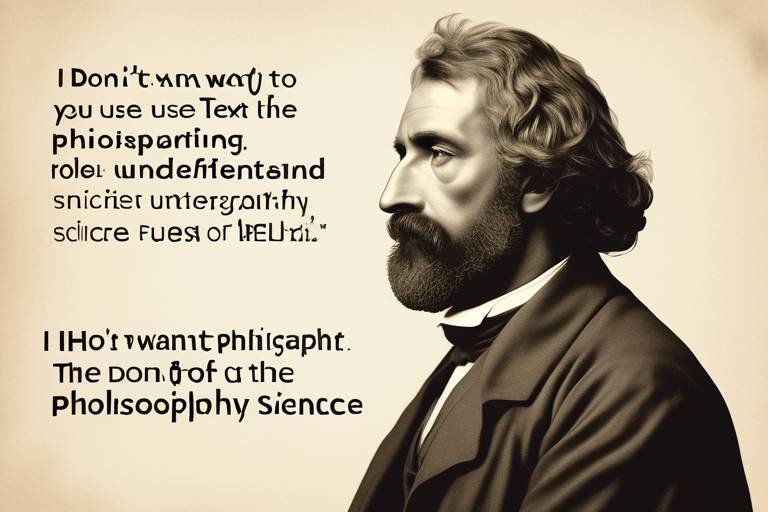The Role of Desire in Philosophical Thought
Desire is not just a fleeting feeling; it’s a powerful force that shapes our very existence. It drives us to seek out what we want, whether that’s love, success, or even understanding the universe. Throughout history, philosophers have grappled with the complexities of desire, exploring its implications on human behavior, ethics, and our quest for meaning. This article will take you on a journey through the rich tapestry of philosophical thought, illustrating how desire is intricately woven into the fabric of our lives.
To truly grasp the significance of desire, we must first recognize its multifaceted nature. It can be a source of motivation, a catalyst for action, or even a reason for conflict. Philosophers from various traditions have interpreted desire in different ways, highlighting its centrality to human motivation. For instance, in some Eastern philosophies, desire is seen as a root of suffering, while in Western thought, it’s often linked to the pursuit of happiness and fulfillment. This duality makes desire a fascinating subject for philosophical inquiry.
As we dive deeper, we will explore how ancient thinkers like Plato and Aristotle laid the groundwork for understanding desire. Their insights have paved the way for contemporary discussions, influencing modern philosophers who have redefined desire in relation to freedom, identity, and existential questions. Desire is not merely a personal experience; it’s a fundamental aspect of our shared human condition. It raises questions about what it means to live a good life and how we relate to ourselves and others.
In the following sections, we will examine desire’s role in various philosophical frameworks, from ancient to modern times, and its profound impact on ethics and existential thought. By the end of this exploration, you’ll see how desire is not just a personal longing but a vital element of our collective philosophical journey.
Desire is a fundamental aspect of human existence. This section delves into its definitions and various interpretations across different philosophical traditions, highlighting its complexity and centrality to human motivation.
Ancient philosophers, such as Plato and Aristotle, offered profound insights into desire's role in human behavior. This section discusses their perspectives and how they influenced later philosophical thought regarding ethics and happiness.
Plato viewed desire as a driving force that could lead individuals toward the pursuit of the good. This subsection examines his allegorical approaches and their implications for understanding desire's dual nature.
Aristotle's concept of desire was closely linked to virtue and rationality. This subsection explores how he categorized desires and their impact on ethical living and personal fulfillment.
Modern philosophers have redefined desire, often linking it to concepts of freedom and identity. This section reviews key thinkers and their contributions to our understanding of desire in the contemporary context.
Existentialist philosophers like Sartre emphasized the role of desire in defining one's essence. This subsection discusses how desire influences personal choice and authenticity in the face of absurdity.
Psychoanalytic theory, particularly Freud's, offers a unique lens on desire, viewing it as a central element in human psychology. This subsection examines the implications of desire in shaping the unconscious mind.
The relationship between desire and ethics is a critical area of philosophical inquiry. This section explores how desire influences moral decision-making and the formation of ethical frameworks.
Utilitarian philosophers argue that desire is key to understanding happiness. This subsection evaluates how desire informs utilitarian ethics and the pursuit of the greatest good for the greatest number.
Virtue ethics, rooted in Aristotelian thought, emphasizes the role of desire in developing moral character. This subsection discusses how aligning desires with virtues can lead to a fulfilling life.
- What is the philosophical significance of desire?
Desire plays a crucial role in shaping human experience, influencing our motivations, ethical decisions, and existential inquiries.
- How do ancient philosophers view desire?
Ancient philosophers like Plato and Aristotle saw desire as a driving force that could lead to the pursuit of good and fulfillment.
- What is the relationship between desire and ethics?
Desire influences moral decision-making and the formation of ethical frameworks, impacting how we define right and wrong.

The Nature of Desire
Desire is an intrinsic part of what it means to be human. It permeates our thoughts and actions, acting as a catalyst for motivation and a compass for our choices. But what exactly is desire? At its core, desire can be defined as a strong feeling of wanting to have something or wishing for something to happen. Yet, this definition barely scratches the surface of its complexity. Philosophers have pondered over its nature for centuries, offering various interpretations that reflect our multifaceted existence.
Across different philosophical traditions, desire has been viewed through numerous lenses. For instance, in Eastern philosophies, desire is often seen as a source of suffering, as articulated in Buddhist teachings. Here, the cessation of desire is a pathway to enlightenment. In contrast, Western philosophies, particularly those stemming from ancient Greece, often regard desire as a driving force that propels individuals toward their goals and aspirations. This dichotomy highlights the intricate relationship between desire and human experience.
Moreover, desire can be categorized into different types, each with its own implications.
- Biological Desire: This encompasses the basic needs for survival, such as hunger and thirst.
- Emotional Desire: These desires are tied to our emotional states, such as the longing for love and connection.
- Aspirational Desire: This type reflects our ambitions and dreams, pushing us to achieve our highest potential.
In essence, desire is not merely a fleeting emotion; it is a powerful force that shapes our identities and experiences. It can lead us to great achievements or, conversely, to profound dissatisfaction if not aligned with our true values. As we navigate through life, the interplay of desire with our ethical frameworks and existential questions continues to be a topic of intense philosophical inquiry. The nature of desire invites us to reflect on what we truly seek and why, making it an ever-relevant subject in the quest for understanding ourselves and the world around us.
- What is the philosophical significance of desire? Desire is central to understanding human motivation and ethical behavior, influencing how we perceive happiness and fulfillment.
- How do different cultures view desire? Different cultures interpret desire in varied ways; some see it as a source of suffering, while others view it as a driving force for personal achievement.
- Can desire be harmful? Yes, unchecked desire can lead to negative consequences such as addiction or dissatisfaction. It's essential to align desires with personal values.

Desire in Ancient Philosophy
Desire has been a central theme in ancient philosophical discourse, with thinkers like Plato and Aristotle offering profound insights that continue to shape our understanding today. These philosophers viewed desire not merely as a simple longing for pleasure but as a complex force that drives human behavior and influences ethical considerations. In essence, they believed that desire plays a pivotal role in guiding individuals toward a more meaningful existence.
Plato, for instance, approached desire through a dual lens, distinguishing between base desires and higher aspirations. He proposed that while our physical desires could lead us astray, the pursuit of higher ideals—such as knowledge and virtue—could elevate the soul. This notion is vividly illustrated in his famous allegory of the cave, where prisoners are chained and can only see shadows of reality. Plato argued that the desire for enlightenment compels individuals to turn away from the shadows and seek the truth outside the cave. In this way, desire becomes a powerful motivator for personal growth and ethical living.
On the other hand, Aristotle took a more pragmatic approach to desire, linking it closely with virtue and rationality. He categorized desires into rational and irrational, asserting that a virtuous life is one where rational desires align with ethical principles. Aristotle believed that by cultivating virtuous desires, individuals could achieve true happiness, which he defined as eudaimonia or flourishing. This perspective highlights the importance of self-regulation and the need to harmonize our desires with our moral compass. In Aristotle's view, the balance of desire is essential for leading a fulfilling life.
To summarize the perspectives of these ancient philosophers, we can create a simple comparison table:
| Philosopher | View on Desire | Implications for Ethics |
|---|---|---|
| Plato | Desire as a dual force; can lead to higher ideals or base instincts | Encourages the pursuit of knowledge and virtue |
| Aristotle | Desire linked to virtue and rationality; categorized into rational and irrational | Emphasizes the alignment of desires with ethical living for true happiness |
In conclusion, the exploration of desire in ancient philosophy reveals its intricate role in shaping human behavior and ethical frameworks. By understanding how these foundational thinkers approached desire, we can better appreciate its significance in our own lives. Their insights encourage us to reflect on our desires: Are they leading us toward a more profound understanding of ourselves and the world around us, or are they simply satisfying fleeting cravings? This inquiry remains as relevant today as it was in ancient times, inviting us to engage deeply with the nature of our desires.
- What is the significance of desire in ancient philosophy? Desire is seen as a driving force that influences ethical behavior and personal fulfillment.
- How did Plato view desire? Plato viewed desire as a dual force that could either lead to enlightenment or base instincts.
- What was Aristotle's perspective on desire? Aristotle linked desire to virtue and rationality, emphasizing the importance of aligning desires with ethical principles for achieving happiness.

Plato's Theory of Desire
Plato, one of the most influential figures in Western philosophy, had a profound understanding of desire that transcended mere want or need. For him, desire was not just a fleeting emotion; it was a powerful driving force that could lead individuals toward the pursuit of the good. In his dialogues, particularly in works like "The Symposium" and "Phaedrus," Plato articulates a complex view of desire that intertwines with his ideas about love, beauty, and the ultimate truth.
At the heart of Plato's theory lies the concept of Platonic love, which suggests that desire can elevate the soul. He believed that through the experience of beauty—whether in a person, an idea, or nature—individuals could transcend their physical desires and aspire towards the higher forms of existence. This process is akin to climbing a ladder, where each rung represents a deeper understanding of beauty and truth. The ultimate goal is to reach the Form of Beauty itself, a state of perfect knowledge and fulfillment.
Plato also introduces the idea of the charioteer analogy, where he compares the soul to a charioteer guiding two horses: one representing rational desire and the other representing irrational desire. The charioteer must skillfully manage these conflicting forces to achieve harmony and reach the truth. This metaphor beautifully encapsulates the dual nature of desire; it can either lead us astray or guide us toward enlightenment, depending on how we choose to harness it.
Furthermore, Plato posited that our desires are often misaligned with what is genuinely good for us. He argued that many of our earthly desires, such as the craving for wealth or power, can distract us from pursuing higher virtues. This misalignment calls for a philosophical examination of our desires—an introspection that encourages individuals to question what they truly seek in life. Plato's emphasis on the need for education and philosophical inquiry is crucial here; he believed that understanding the nature of desire could lead to a more virtuous and fulfilling life.
In summary, Plato's theory of desire is a rich tapestry woven with themes of love, beauty, and the pursuit of truth. It challenges us to reflect on our desires and consider their implications for our ethical and existential journeys. By recognizing the dual nature of desire, we can strive for a life that aligns our motivations with a greater understanding of the good.
- What is the significance of desire in Plato's philosophy?
Desire is central to Plato's philosophy as it drives individuals toward the pursuit of the good and higher truths.
- How does Plato differentiate between rational and irrational desires?
Plato uses the charioteer analogy to illustrate the conflict between rational desires, which lead to enlightenment, and irrational desires, which can lead one astray.
- Can desire lead to ethical living according to Plato?
Yes, by aligning one's desires with the pursuit of beauty and truth, individuals can achieve a more virtuous and fulfilling life.

Aristotle's View on Desire
Aristotle, one of the towering figures of ancient philosophy, had a nuanced understanding of desire that intertwined with his broader ethical framework. For him, desire was not merely an impulsive yearning for pleasure; rather, it was a vital component of human motivation that could lead to both virtue and vice. He categorized desires into two main types: rational desires, which align with our higher faculties and contribute to our moral character, and irrational desires, which can lead us astray if not governed by reason. This duality reflects Aristotle's belief that the cultivation of virtue involves harmonizing our desires with rational thought.
In Aristotle's ethical framework, the concept of the Golden Mean plays a pivotal role. He posited that moral virtue lies between two extremes: excess and deficiency. For example, courage is the mean between recklessness and cowardice. In this context, desires must be moderated and directed towards the mean to achieve a balanced and fulfilling life. Aristotle argued that we should not simply follow our desires blindly; instead, we must engage in a process of self-reflection and rational deliberation to determine which desires are worth pursuing.
Moreover, Aristotle emphasized the importance of habituation in shaping our desires. He believed that by repeatedly practicing virtuous actions, we can cultivate desires that align with virtue. This idea suggests that our desires are not fixed but can be developed over time through conscious effort. For instance, if we consistently choose to act generously, we will gradually foster a desire to be generous, making it a natural inclination rather than a forced action.
To illustrate Aristotle’s views, consider the following table that summarizes the key aspects of his perspective on desire:
| Type of Desire | Description | Impact on Ethics |
|---|---|---|
| Rational Desires | Aligned with reason and virtue | Promote moral character and ethical living |
| Irrational Desires | Impulsive and often lead to excess or deficiency | Can lead to vice if not moderated |
In essence, Aristotle's view on desire underscores the importance of reason in ethical decision-making. He believed that a well-lived life is one where desires are not only acknowledged but are also guided by rational thought and virtue. This perspective invites us to reflect on our own desires and consider how they shape our actions and character. Are we allowing our desires to lead us, or are we consciously directing them towards a virtuous life?
- What are the two types of desire according to Aristotle? Rational desires, which align with virtue, and irrational desires, which can lead to vice.
- What is the Golden Mean? It is the idea that moral virtue lies between two extremes: excess and deficiency.
- How can desires be cultivated according to Aristotle? Through habituation and consistent practice of virtuous actions.

Desire in Modern Philosophy
In the realm of modern philosophy, desire takes on new dimensions, often interwoven with concepts of freedom, identity, and the essence of being. Thinkers like Friedrich Nietzsche, Jean-Paul Sartre, and Sigmund Freud have significantly influenced our understanding of desire, making it a pivotal element in the discussion of human existence. These philosophers challenge us to reconsider how desire shapes not just our actions but our very identities. It's fascinating to think about how a simple yearning can lead to profound changes in the way we perceive ourselves and our place in the world.
For instance, Sartre's existentialism posits that desire is not merely a response to external stimuli but a fundamental aspect of our freedom. He argues that we are condemned to be free, meaning that we bear the weight of our choices, and in this freedom, our desires play a crucial role. Sartre famously declared that "existence precedes essence," suggesting that we define ourselves through our desires and choices. This idea opens up a world where our aspirations and longings are not just trivial whims but are central to our identity. In this light, desire becomes a double-edged sword—it can lead us to authentic living or plunge us into despair when we confront the absurdity of existence.
Moreover, Freud's psychoanalytic theory introduces a psychological perspective on desire, positing that it is deeply rooted in our unconscious mind. He believed that our desires, particularly sexual and aggressive ones, are often repressed, leading to internal conflicts. Freud's model implies that understanding our desires can unlock the mysteries of our psyche and lead to greater self-awareness. This exploration of desire as a driving force behind human behavior not only informs psychotherapy but also enriches philosophical discourse, prompting us to consider how our hidden desires influence our conscious choices.
Modern philosophy also sees desire linked with social and political contexts. Thinkers like Herbert Marcuse argue that desire is shaped by societal structures and can be manipulated by cultural forces. This perspective raises critical questions about the nature of our wants and how they are influenced by consumerism and societal expectations. Are our desires truly our own, or are they reflections of the society we inhabit? This inquiry leads to a deeper understanding of how desire can be both liberating and constraining, depending on the context in which it arises.
In summary, desire in modern philosophy is a complex and multifaceted concept that challenges us to explore the depths of our motivations and the implications of our choices. It serves as a bridge between our internal selves and the external world, shaping our identities and ethical frameworks. By examining desire through various philosophical lenses, we gain insight into the human experience, ultimately recognizing that our desires are not just personal yearnings but are also deeply intertwined with the fabric of society.
- What is the role of desire in modern philosophy?
Desire in modern philosophy is seen as a crucial element that shapes identity, freedom, and ethical considerations. Philosophers like Sartre and Freud emphasize its significance in understanding human behavior and consciousness. - How does existentialism relate to desire?
Existentialism posits that desire is fundamental to defining one's essence. It suggests that our choices, driven by desire, shape who we are and how we interact with the world. - Can desire be both positive and negative?
Yes, desire can lead to personal fulfillment and authenticity but can also result in despair and conflict, particularly when desires are repressed or manipulated by societal norms.

Existentialism and Desire
Existentialism, a philosophical movement that emerged in the 20th century, profoundly reshaped our understanding of human existence, particularly through the lens of desire. Thinkers like Jean-Paul Sartre and Simone de Beauvoir argued that desire is not merely a biological instinct but a fundamental aspect of what it means to be human. In this view, desire becomes a powerful force that drives individuals to define their essence and make choices that reflect their true selves. Have you ever felt torn between what society expects of you and what you genuinely want? That's the essence of existentialist thought, where desire plays a pivotal role in navigating the complexities of life.
Sartre famously posited that "existence precedes essence," suggesting that individuals are not born with a predetermined nature but instead create their essence through choices driven by desire. This idea places immense responsibility on each person to confront their desires honestly and authentically. Imagine standing at a crossroads, with one path leading to societal conformity and the other to personal authenticity. The choice you make, influenced by your desires, shapes who you become. In this sense, desire is not just a fleeting feeling; it is the compass guiding us through the absurdity of existence.
Moreover, existentialists argue that desires can often be in conflict. For instance, a person might desire freedom and self-expression yet feel constrained by societal norms or personal fears. This tension can lead to a profound sense of alienation, as individuals grapple with the disparity between their desires and their reality. Sartre's concept of bad faith illustrates this struggle, where individuals deceive themselves about their desires to avoid the anxiety of making authentic choices. It raises the question: how often do we suppress our true desires to fit into predefined roles?
In the existentialist framework, embracing desire is essential for achieving authenticity. The act of acknowledging and pursuing one's desires, even in the face of societal pressures, is a form of rebellion against the absurd. Consider the following key points that highlight the relationship between existentialism and desire:
- Authenticity: Living in accordance with one's true desires leads to a more authentic existence.
- Choice: Desire fuels the choices we make, shaping our identity and life path.
- Conflict: The tension between desires and societal expectations can lead to existential angst.
Ultimately, existentialism teaches us that desire is not merely a source of suffering or conflict but a vital component of our journey toward self-discovery and fulfillment. By embracing our desires, we can forge a path that reflects our true selves, allowing us to navigate the complexities of existence with courage and purpose. So, the next time you find yourself at a crossroads, remember that your desires hold the key to defining who you are and who you wish to become.
- What is existentialism? Existentialism is a philosophical movement that emphasizes individual existence, freedom, and choice, focusing on the subjective experience of being human.
- How does desire influence our choices? Desire serves as a motivating force that shapes our decisions and actions, guiding us toward authenticity and self-definition.
- Can desire lead to conflict? Yes, desires can often conflict with societal norms or personal beliefs, leading to feelings of alienation or anxiety.
- What role does authenticity play in existentialism? Authenticity is central to existentialism, as it encourages individuals to live in alignment with their true desires and values, rather than conforming to external expectations.

Desire and Psychoanalysis
Psychoanalysis offers a fascinating lens through which to view the concept of desire, particularly through the works of Sigmund Freud. In Freud's framework, desire is not merely a fleeting wish or a simple craving; rather, it is a complex, often unconscious force that drives human behavior. Freud posited that our desires stem from deep-seated instincts and unresolved conflicts, frequently manifesting in dreams, slips of the tongue, and even neurotic behaviors. This perspective invites us to consider desire as a pivotal element of our psychological makeup, influencing not only our actions but also our identities.
Freud categorized desires into two primary types: libido and death drive. The libido represents our life instincts, driving us towards pleasure, creativity, and connection with others. Conversely, the death drive reflects our darker impulses, inclining us towards aggression and self-destruction. This dichotomy suggests that desire is not a straightforward path to fulfillment; instead, it is fraught with tension and conflict. For instance, an individual may desire love and companionship while simultaneously grappling with fears of intimacy, leading to a push-pull dynamic in their relationships.
In the psychoanalytic process, exploring these desires can lead to profound insights. Through techniques such as free association and dream analysis, individuals can uncover the hidden motivations behind their actions. This journey into the unconscious allows for a better understanding of how desires shape our thoughts and behaviors. For example, a person who finds themselves repeatedly sabotaging their romantic relationships may discover that their fear of abandonment—rooted in childhood experiences—drives their actions. By bringing these unconscious desires to light, individuals can work towards reconciling their inner conflicts and fostering healthier relationships.
Furthermore, desire plays a crucial role in the formation of our identity. In psychoanalysis, the way we navigate our desires can significantly influence our self-concept and life choices. The interplay between conscious and unconscious desires can lead to a rich tapestry of personal experiences, shaping who we are and how we relate to the world. This dynamic relationship emphasizes the importance of understanding our desires—not only as a path to self-discovery but also as a means to achieve greater emotional well-being.
In summary, psychoanalysis provides a profound exploration of desire, revealing it as a powerful and often conflicting force within us. By examining our desires through this lens, we not only gain insight into our motivations but also uncover the intricate ways in which these desires shape our lives. As we navigate the complexities of our inner worlds, understanding the role of desire becomes essential for personal growth and fulfillment.
- What is the role of desire in psychoanalysis?
Desire is viewed as a central element in human psychology, influencing behavior and identity. It often stems from unconscious instincts and conflicts. - How does Freud categorize desire?
Freud categorizes desire into libido (life instincts) and death drive (destructive impulses), highlighting the dual nature of human motivation. - Can understanding desire lead to personal growth?
Yes, by exploring and understanding our desires, we can gain insights into our motivations, leading to healthier relationships and emotional well-being.

Desire and Ethics
When we dive into the intricate relationship between desire and ethics, we uncover a fascinating landscape where our wants and moral principles intersect. At its core, desire is not merely a fleeting wish; it is a powerful motivator that drives our actions and decisions. Think about it: every choice we make is often influenced by what we desire, whether it's the pursuit of happiness, success, or even love. This interplay raises essential questions about the nature of morality itself. Can our desires lead us astray, or can they guide us toward a more fulfilling ethical life?
Philosophers have long debated how desire shapes our moral framework. For some, desire is seen as a potential source of ethical dilemmas. When our desires conflict with societal norms or the well-being of others, we are faced with a moral quandary. For instance, consider a situation where someone desires to achieve a personal goal that may harm another. This conflict illustrates the tension between individual desires and collective ethics, prompting us to ask: should we prioritize our desires, or should we align them with ethical considerations?
On the other hand, desire can also serve as a catalyst for ethical behavior. Many ethical theories, such as utilitarianism, posit that understanding human desires is crucial for promoting the greatest good. In this framework, the happiness derived from fulfilling desires is the ultimate measure of morality. Here’s how desire plays a pivotal role:
| Aspect | Utilitarian Perspective |
|---|---|
| Definition of Good | Maximizing happiness and minimizing suffering. |
| Role of Desire | Desires inform what makes individuals happy, guiding moral decisions. |
| Ethical Implication | Actions are moral if they fulfill the desires of the majority. |
This table highlights how utilitarianism connects desire with ethical outcomes. However, it's essential to recognize that not all desires contribute positively to ethical living. In fact, some desires may lead us to act selfishly or harmfully. This is where virtue ethics comes into play, emphasizing the importance of aligning our desires with moral virtues. According to this perspective, cultivating virtuous desires—such as compassion, honesty, and courage—can lead to a more ethical and fulfilling life.
In essence, the relationship between desire and ethics is complex and multifaceted. It challenges us to reflect on our motivations and the consequences of our actions. As we navigate our desires, we must ask ourselves: Are we pursuing what we truly want, or are we simply following societal expectations? Are our desires aligned with our ethical beliefs, or do they lead us down a questionable path?
Ultimately, the exploration of desire in the realm of ethics invites us to engage in a deeper understanding of ourselves and the world around us. It encourages us to seek a balance between fulfilling our desires and adhering to ethical principles, fostering a life that is not only satisfying but also meaningful.
- How does desire influence moral decision-making?
Desire can significantly impact our choices, often guiding us toward actions that fulfill our wants. However, it can also lead to ethical conflicts when personal desires clash with moral obligations. - Can desire be considered a positive force in ethics?
Yes, when aligned with virtuous goals, desire can motivate ethical behavior and contribute to the greater good, as seen in utilitarian frameworks. - What role do societal norms play in shaping our desires?
Societal norms can influence our desires by dictating what is considered acceptable or desirable, which can either support or hinder ethical decision-making.

Desire and Utilitarianism
Utilitarianism, a philosophical doctrine that advocates for actions that maximize happiness and well-being for the majority, intricately weaves the concept of desire into its ethical framework. At its core, utilitarianism posits that the moral worth of an action is determined by its contribution to overall utility, which is often understood as the balance of pleasure over pain. This perspective invites a fascinating exploration of how human desires shape our understanding of happiness and ethical decision-making.
One of the key figures in the development of utilitarian thought, Jeremy Bentham, famously argued that the principle of utility should guide our actions. He believed that desires are fundamental to determining what constitutes happiness. For Bentham, it was essential to assess the intensity, duration, certainty, and extent of desires when evaluating the consequences of actions. This led to his well-known hedonic calculus, a method for quantifying pleasure and pain to guide ethical decisions.
In practical terms, this means that desires serve as a compass, guiding individuals and societies toward actions that promote the greatest good for the greatest number. When a decision is made, the desires of those affected must be considered. For example, if a community desires a new park, the utilitarian approach would assess whether the fulfillment of this desire contributes to the overall happiness of the community, outweighing any potential downsides, such as the cost or environmental impact.
However, the relationship between desire and utilitarianism is not without its complexities. Critics argue that focusing solely on desires can lead to ethical dilemmas, particularly when the desires of one group conflict with those of another. For instance, if a majority desires a policy that benefits them at the expense of a minority, the utilitarian principle can be challenged. This raises important questions about the nature of desire itself. Are all desires equally valid? Should the ethical framework prioritize certain desires over others?
To navigate these challenges, utilitarian philosophers have proposed various approaches, such as the distinction between higher and lower pleasures. John Stuart Mill, another pivotal figure in utilitarianism, emphasized that not all pleasures are of equal quality. He argued that intellectual and moral pleasures (higher pleasures) should be weighed more heavily than mere physical gratification (lower pleasures). This perspective suggests that desires should be evaluated not just by their quantity but also by their quality and impact on overall well-being.
In summary, the interplay between desire and utilitarianism highlights a fundamental aspect of ethical inquiry: the need to understand how our desires shape our moral landscape. By examining the desires that underpin our actions, we can better navigate the complexities of ethical decision-making and strive for a more equitable society. Ultimately, the challenge lies in balancing individual desires with the collective good, ensuring that the pursuit of happiness does not come at the expense of others.
- What is utilitarianism? Utilitarianism is an ethical theory that suggests actions are right if they promote happiness and wrong if they produce the opposite of happiness.
- How does desire influence utilitarianism? Desire plays a crucial role in utilitarianism as it helps determine what constitutes happiness and guides moral decision-making.
- What are higher and lower pleasures in utilitarianism? Higher pleasures are intellectual and moral pleasures, while lower pleasures are physical gratifications. Mill argued that higher pleasures should be prioritized in ethical considerations.
- Can utilitarianism lead to ethical dilemmas? Yes, focusing solely on desires can create conflicts, especially when the desires of one group infringe on the well-being of another.

Desire in Virtue Ethics
When we dive into the realm of virtue ethics, we find a fascinating interplay between desire and moral character. Rooted in the teachings of Aristotle, virtue ethics posits that our desires are not simply whims or fleeting thoughts; they are integral to shaping who we are as individuals. Aristotle believed that to live a good life, one must cultivate the right desires—those that align with virtues such as courage, temperance, and wisdom. In this framework, desires serve as a compass that guides our actions and decisions, ultimately influencing our path toward eudaimonia, or human flourishing.
But how do desires transform into virtues? This is where the concept of habituation comes into play. Aristotle argued that by consistently practicing virtuous actions, we can develop desires that reflect our ethical ideals. For instance, if someone desires to be courageous, they must actively engage in brave acts, thereby reinforcing that desire and making it a part of their character. This cyclical process of desire and action not only shapes our moral landscape but also enhances our ability to make ethical decisions in complex situations.
Moreover, the alignment of desire with virtue is crucial in navigating life's moral dilemmas. Imagine a scenario where one is faced with the temptation to act selfishly for personal gain. In such a case, a person who has cultivated desires aligned with virtues like generosity and justice will find it easier to resist the urge to act solely for their benefit. Instead, they will be driven by a desire to contribute positively to the community, reflecting a deeper understanding of their role in the social fabric.
To illustrate how this works in practice, consider the following table that outlines the relationship between specific virtues and their corresponding desires:
| Virtue | Desire | Example Action |
|---|---|---|
| Courage | Desire to face challenges | Standing up against injustice |
| Temperance | Desire for moderation | Choosing healthy meals over junk food |
| Wisdom | Desire for knowledge | Pursuing education and self-improvement |
This table highlights how specific virtues can be directly linked to desires that motivate ethical behavior. By fostering these desires, individuals can enhance their moral character and contribute to a more virtuous society. The essence of virtue ethics lies in this transformative journey—shaping our desires to align with our highest ideals, thereby enriching our lives and the lives of those around us.
In conclusion, the role of desire in virtue ethics is not merely about wanting or wishing for something; it’s about cultivating a deep-seated alignment between our desires and our ethical principles. This philosophical approach encourages us to reflect on our desires critically, ensuring that they lead us toward a fulfilling and meaningful existence. After all, as Aristotle might suggest, the right desires can illuminate the path to true happiness and moral integrity.
- What is virtue ethics?
Virtue ethics is a philosophical approach that emphasizes the role of character and virtue in moral philosophy, rather than rules or consequences. - How does desire influence ethical behavior?
Desire shapes our motivations and actions, guiding us toward choices that reflect our values and virtues. - Can desires be changed?
Yes, through practice and habituation, individuals can develop desires that align more closely with virtuous behavior. - What is eudaimonia?
Eudaimonia is a Greek term often translated as "flourishing" or "the good life," representing the ultimate goal of virtue ethics.
Frequently Asked Questions
- What is the significance of desire in philosophical thought?
Desire plays a crucial role in shaping human experience and ethical frameworks. It influences our motivations, decisions, and ultimately our understanding of happiness and fulfillment. Philosophers throughout history have examined desire to understand its impact on moral choices and personal identity.
- How did ancient philosophers view desire?
Ancient philosophers like Plato and Aristotle offered profound insights into desire. Plato saw it as a driving force that could lead individuals toward the pursuit of the good, while Aristotle linked desire with virtue and rationality, suggesting that our desires must align with ethical living for personal fulfillment.
- What is Plato's theory of desire?
Plato's theory of desire emphasizes its dual nature: it can lead us towards higher truths and the good or, conversely, to base instincts. His allegorical approaches illustrate how desire can guide individuals in their quest for a meaningful life.
- How does Aristotle categorize desire?
Aristotle categorized desires into different types, linking them to rational thought and virtue. He believed that fulfilling our rational desires leads to a virtuous life, suggesting that ethical living is about harmonizing our desires with our moral values.
- What role does desire play in modern philosophy?
In modern philosophy, desire is often linked to concepts of freedom and identity. Thinkers like Sartre emphasized that our desires define our essence, influencing our choices and authenticity in a seemingly absurd world.
- How does psychoanalysis view desire?
Psychoanalytic theory, particularly through Freud, views desire as a central element of human psychology. It suggests that our unconscious desires shape our behaviors and emotional experiences, playing a significant role in our mental health and interpersonal relationships.
- What is the connection between desire and ethics?
The relationship between desire and ethics is fundamental in philosophical inquiry. Desire influences moral decision-making, and understanding this connection helps in forming ethical frameworks that guide our actions and judgments.
- How does desire inform utilitarianism?
Utilitarian philosophers argue that desire is key to understanding happiness. They propose that ethical decisions should aim to maximize happiness for the greatest number, thus highlighting the importance of aligning desires with the collective good.
- What is the role of desire in virtue ethics?
In virtue ethics, desire is essential for developing moral character. It emphasizes that aligning our desires with virtues leads to a fulfilling life, suggesting that cultivating good desires is crucial for ethical living.



















